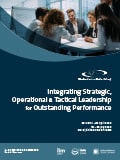Um curso de formação intensivo de desenvolvimento profissional sobre
Managing Change
Through Adaptive Innovation
Porquê escolher este curso de formação?
The Course
Leading Change Through Adaptive Innovation is designed to provide the conceptual and practical tools which business professionals and managers require for leading change in their organizations. These include analyzing the internal and external environments of the firm as well as seeking and identifying trends, threats, risks, and opportunities that threaten the company’s survival or that can propel its growth and help it thrive over the medium and long terms.
The Goals
- Set the conditions for transitioning to a culture of nimbleness, adaptability and experimentation.
- Develop a greater awareness and understanding of the trends and forces affecting society, the industry, the company, and the internal organizational environment.
- Develop a greater appreciation of how these changes occur, how they can be harnessed, and how to lead an organization through them, particularly those changes that are random and uncertain.
- Provide a framework of common tools, skills, and language to guide in initiating and implementing deliberate change and innovative processes at all levels of an organization.
- Develop and apply tools for experimentation, exploration, and trial and error.
The Delegates
- Line and functional managers, team leaders and supervisors in organizations of all sizes
- Professionals responsible for strategy, marketing, business development, and/or product development
- Profissionais de gestão de projectos e programas
- Intermediate and advanced level managers, team leaders and supervisors within all sectors, private and public, profit and not-for-profit.
The Process
The course is a mixture of speaker input, facilitated discussion, syndicate work and practical exercises, with an emphasis on delegate involvement throughout.
The Benefits
Delegates will learn to:
- Analyze and evaluate real and potential trends, competitive threats, uncertainty, risks, and opportunities in the internal and external environments of the company.
- Generate risk mitigation, contingency plans, growth and development initiatives, and innovation on the basis of the preceding analysis.
- Weigh opportunities and initiatives against business and organizational criteria, including identifying and developing those criteria.
- Structure and manage change and innovation processes to maximize the chances of success and growth.
- Lead using the most advanced understandings of intrinsic motivation, inspirational leadership, transformational practices, and experimental approaches, while relating these to organizational goals and values.
The Results
Organizations will benefit through the following results:
- Delegates will become more effective leaders who can inspire and motivate under conditions of constant change, uncertainty, and competition.
- Delegates will acquire the knowledge, skills, and attitudes to predict and identify trends and changes in the internal and external environments of the company.
- Delegates will learn how to plan, organize, direct and control innovation initiatives and change processes.
- Delegates will acquire the knowledge and skills to adapt quickly to change and to lead their respective teams in their own adaptation.
- Delegates will become more able to shape the environment, internal and external, to take advantage of opportunities, while mitigating threats and risks.
O conteúdo do curso
Primeiro dia
The Adaptation Imperative and the Adaptive Business Cycle
- Situational analysis, environmental scanning, and opportunity search
- Sources of trends and changes
- Change dimensions and scenarios
- Deductive process for leveraging observations into opportunities and threats
- Active versus passive adaptation, reacting to change versus shaping change
- Exploring for opportunities and threats through probing and trial and error
Segundo dia
Observation: Seeking Changes and Opportunities
- Situational analysis, environmental scanning, and opportunity search
- Sources of trends and changes
- Change dimensions and scenarios
- Deductive process for leveraging observations into opportunities and threats
- Active versus passive adaptation, reacting to change versus shaping change
- Exploring for opportunities and threats through probing and trial and error
Terceiro dia
Orientation: Turning Opportunities Into Ideas for Thriving
- Turning opportunities and threats into ideas for initiatives, projects, and innovations
- Assessing meaning and fit of potential initiatives, projects, and innovations: orientation questionnaire
- First level analysis and prioritization of initiatives, projects, and innovations
- Experimenting with change versus attempting to manage change deliberately
- Validation of initiatives and ideas against strategy and strategic objectives
- Governance checks and decision points
Quarto dia
Decision: Going from Innovative Ideas to Specific Actions
- Applying the estimate process to generate and analyze options
- Introducing the action planning worksheet
- Developing decision-making criteria
- Sequential versus parallel initiatives
- Conducting risk-reward analysis and identifying critical conditions
- Decision-making on when and whether to proceed with initiatives and changes on a definite or experimental basis
Quinto dia
Action: Successful Implementation of Adaptive Innovations
- Action planning using the action planning worksheet
- Understanding and applying the distinctions between purpose, objective(s), outputs/deliverables, and inputs
- Developing descriptions, objective indicators of success/progress, verification metrics, and confirming critical conditions
- Creating and evaluating pilot initiatives and gradual changes
- Developing a project/implementation structure and plan on the basis of the aforementioned analysis and planning
O certificado
- Certificado de conclusão AZTech para os participantes que frequentam e concluem o curso.
QUER SABERMAIS SOBRE ESTE CURSO?
© 2024. O material publicado pela AZTech aqui apresentado está protegido por direitos de autor. Todos os direitos reservados. Qualquer cópia, distribuição, utilização, disseminação, descarregamento, armazenamento (em qualquer meio), transmissão, reprodução ou utilização não autorizada, no todo ou em parte, deste esquema do curso é proibida e constitui uma violação dos direitos de autor.







